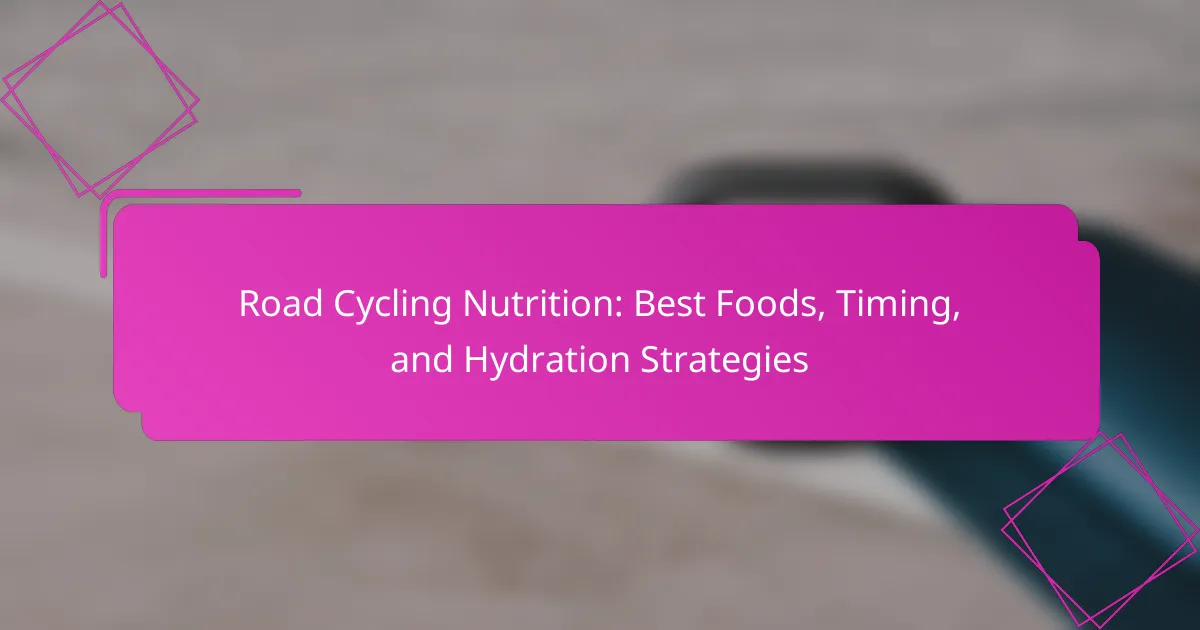Optimising road cycling nutrition is crucial for enhancing performance and recovery. Key aspects include understanding essential nutrients, meal timing, and effective hydration strategies. Focusing on carbohydrates for energy, proteins for muscle repair, and maintaining hydration with fruits and electrolyte-rich snacks will support endurance and overall health. Additionally, recognising regional influences on food choices can further tailor nutrition to individual needs.
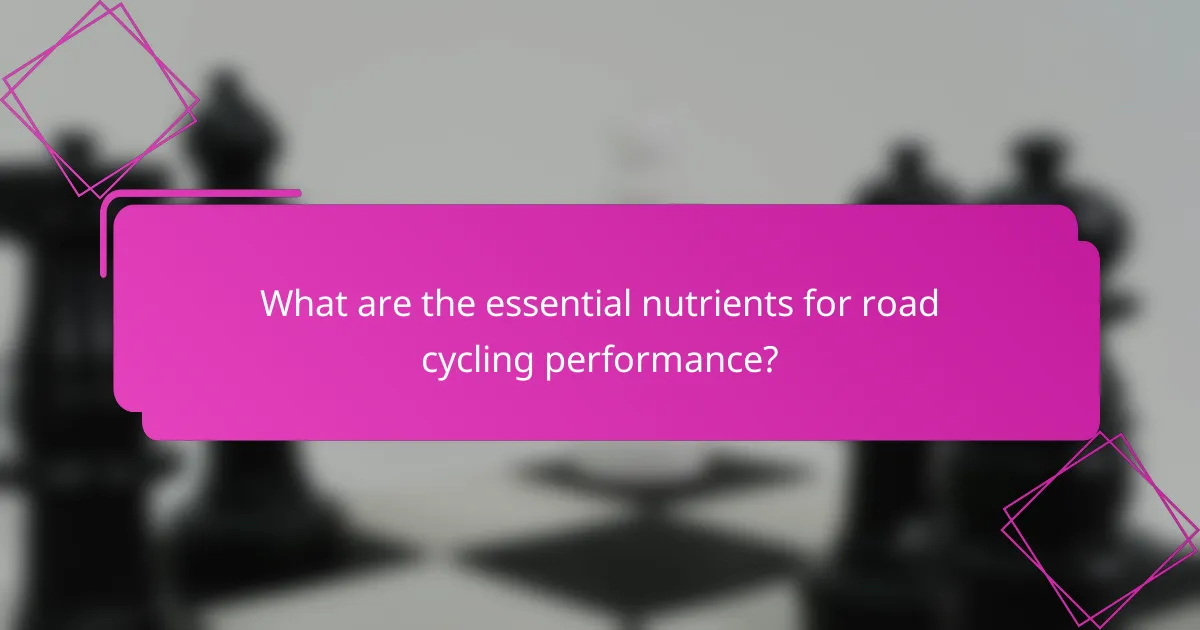
What are the essential nutrients for road cycling performance?
Carbohydrates, proteins, fats, vitamins, and minerals are essential nutrients for road cycling performance.
Carbohydrates provide energy, while proteins aid in muscle repair. Healthy fats support endurance. Vitamins and minerals, such as electrolytes, maintain hydration and overall health. Consuming a balanced diet rich in these nutrients enhances performance and recovery.
How do carbohydrates fuel endurance during long rides?
Carbohydrates are essential for fuelling endurance during long rides by providing a readily available energy source. They replenish glycogen stores in muscles, which is crucial for sustained performance. Consuming complex carbohydrates before and during rides maintains energy levels and delays fatigue. For optimal results, cyclists should aim for 30-60 grams of carbohydrates per hour during prolonged activities.
Why is protein important for muscle recovery in cyclists?
Protein is crucial for muscle recovery in cyclists as it aids in repairing and rebuilding muscle tissues. After intense cycling sessions, protein consumption helps to stimulate muscle protein synthesis, which is essential for recovery. Studies show that consuming 20-30 grams of protein post-exercise can significantly enhance recovery and reduce muscle soreness. Additionally, protein supports the replenishment of glycogen stores when paired with carbohydrates, optimising overall recovery.
Which fats should cyclists include for sustained energy?
Cyclists should include healthy fats like avocados, nuts, and olive oil for sustained energy. These fats provide essential fatty acids and help maintain energy levels during long rides.
Avocados contain monounsaturated fats and potassium, aiding muscle function. Nuts offer protein, fibre, and omega-3 fatty acids, supporting recovery and reducing inflammation. Olive oil, rich in antioxidants, enhances overall health and endurance.
Incorporating these fats into meals can improve performance and prolong energy availability, making them vital for cyclists.
What vitamins and minerals are crucial for cyclists’ health?
Cyclists need vitamins and minerals like vitamin D, calcium, iron, and magnesium for optimal health. These nutrients support bone strength, energy production, and muscle function.
Vitamin D helps with calcium absorption, essential for bone health. Calcium is crucial for muscle contractions and nerve function. Iron is vital for oxygen transport in the blood, while magnesium aids in muscle recovery and energy metabolism.
A balanced diet rich in fruits, vegetables, whole grains, lean proteins, and dairy can provide these nutrients effectively. Cyclists should consider supplementation if dietary intake is insufficient, particularly for iron and vitamin D, which can be challenging to obtain in adequate amounts through food alone.
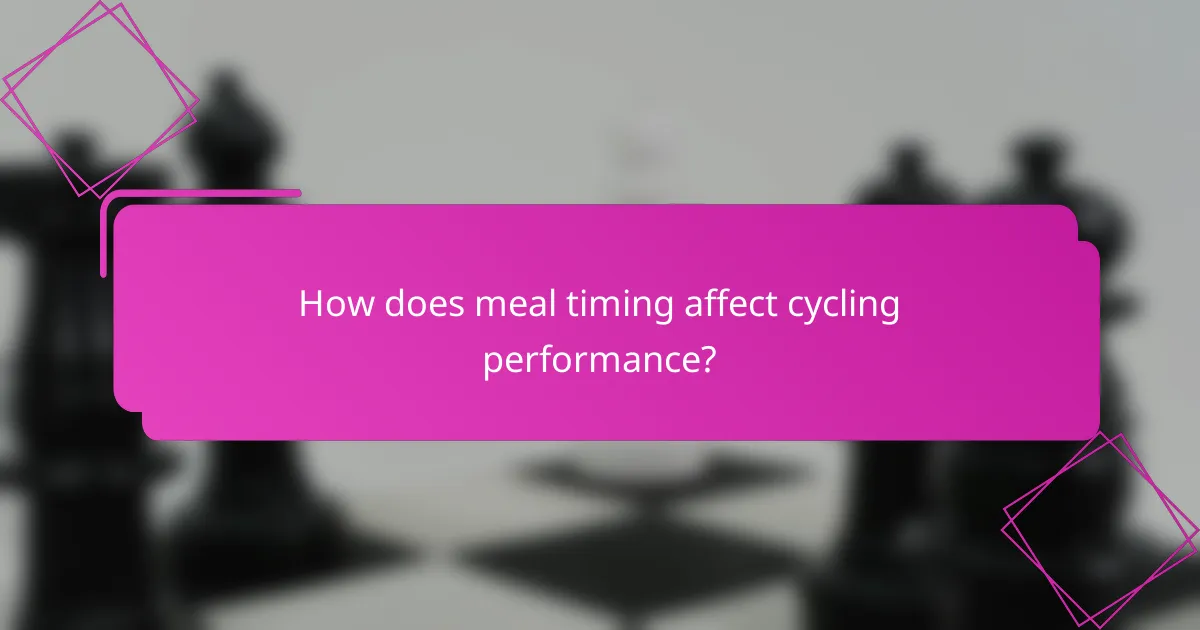
How does meal timing affect cycling performance?
Meal timing significantly impacts cycling performance by optimising energy levels and recovery. Consuming carbohydrates before and during rides enhances endurance, while post-ride protein intake aids muscle repair. Research shows that timing meals around training sessions can improve overall performance metrics. For instance, eating a carbohydrate-rich meal 3-4 hours before cycling can increase glycogen stores, leading to better stamina.
What should cyclists eat before a ride for optimal energy?
Cyclists should consume easily digestible carbohydrates before a ride for optimal energy. Foods like bananas, oatmeal, and energy bars provide quick fuel. Aim for a meal 1-3 hours before riding to maximise energy levels. Hydration is essential; drink water or electrolyte beverages to maintain performance.
How often should cyclists refuel during long rides?
Cyclists should refuel every 30 to 60 minutes during long rides. This timing ensures optimal energy levels and hydration. Consuming 30 to 60 grams of carbohydrates per hour helps maintain performance. Hydration is equally crucial; aim for 500 to 1000 millilitres of fluid per hour, depending on conditions. Adjust intake based on individual needs and ride intensity for best results.
What are the best post-ride meals for recovery?
The best post-ride meals for recovery include a balance of carbohydrates and protein. Options like a turkey sandwich, Greek yogurt with fruit, or a smoothie with protein powder are effective. These meals help replenish glycogen stores and repair muscle tissue. Aim to consume these within 30 minutes to two hours after cycling for optimal recovery.
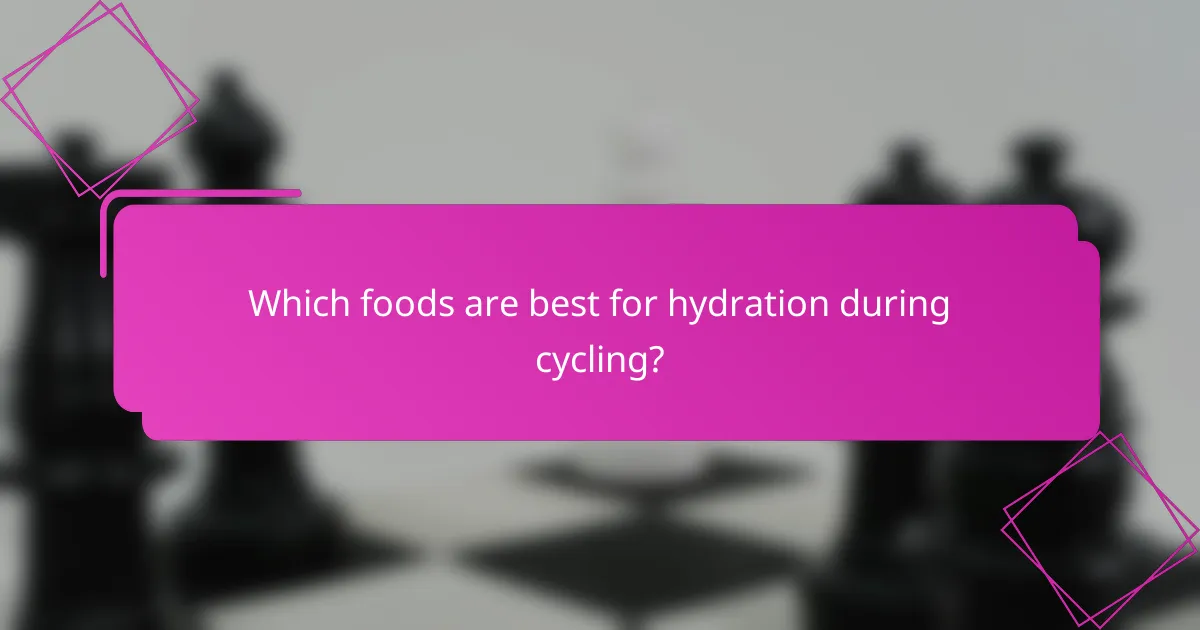
Which foods are best for hydration during cycling?
Fruits and vegetables with high water content are best for hydration during cycling. Watermelon, cucumbers, oranges, and strawberries are excellent choices. These foods provide essential electrolytes and carbohydrates, enhancing hydration and energy levels. For example, watermelon contains about 92% water, making it a top option for cyclists. Additionally, incorporating electrolyte-rich snacks like bananas can further support hydration during long rides.
What role does water play in cycling performance?
Water is essential for optimal cycling performance as it regulates body temperature and maintains hydration. Proper hydration enhances endurance and prevents fatigue. During intense cycling, even a 2% loss in body weight due to dehydration can significantly impair performance. Athletes should aim for 500-750 mL of water intake per hour during rides, adjusting based on conditions and intensity. Hydration strategies should include pre-ride, during, and post-ride fluid intake to ensure peak performance.
How can electrolytes improve hydration for cyclists?
Electrolytes significantly enhance hydration for cyclists by maintaining fluid balance and preventing dehydration. When cyclists sweat, they lose not only water but also essential electrolytes like sodium, potassium, and magnesium. Replenishing these electrolytes helps improve muscle function and endurance. Research indicates that optimal electrolyte levels can enhance performance by reducing fatigue and cramping during long rides. For example, a study showed that cyclists who consumed electrolyte-rich drinks experienced less muscle fatigue compared to those who only consumed water. Thus, incorporating electrolytes into hydration strategies is crucial for maintaining peak performance during road cycling.
Which hydration strategies are effective for long-distance rides?
Effective hydration strategies for long-distance rides include drinking fluids regularly, consuming electrolyte-rich beverages, and monitoring sweat loss. Aim to drink 500-1000 mL of water per hour, depending on conditions. Electrolytes help maintain hydration balance, especially in hot weather. Consider using sports drinks or electrolyte tablets to replenish lost minerals.
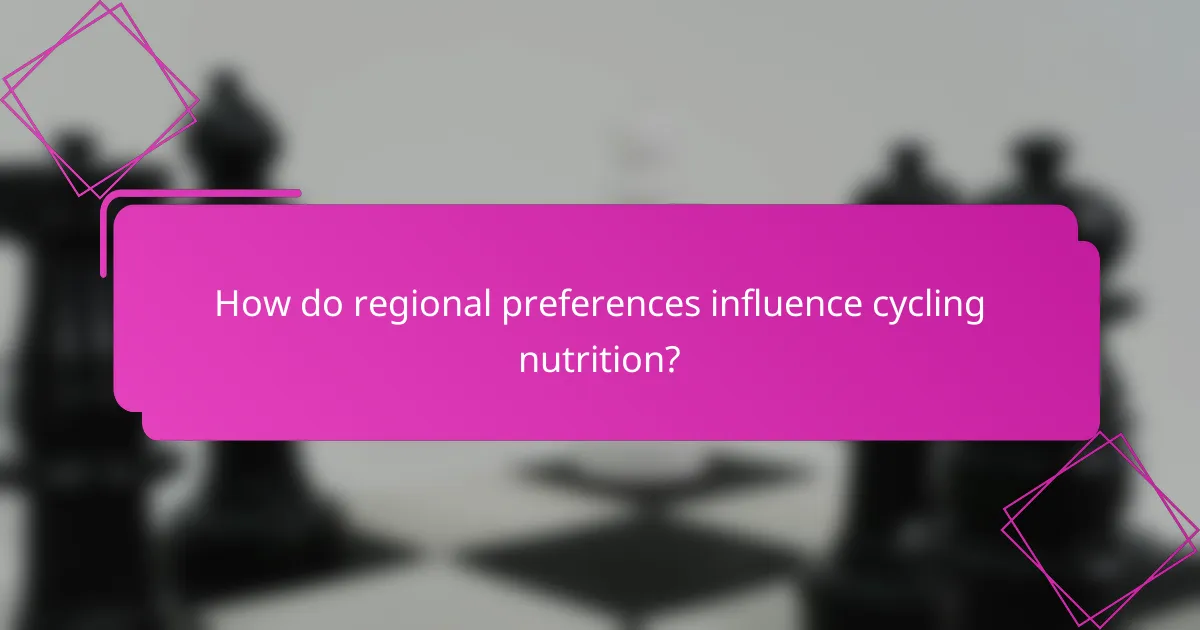
How do regional preferences influence cycling nutrition?
Regional preferences significantly shape cycling nutrition by influencing food choices, hydration practices, and meal timing. Local climates and cultures dictate available ingredients, impacting energy sources cyclists prefer. For example, Mediterranean regions favour olive oil and fresh vegetables, while Northern climates may emphasise hearty grains and root vegetables.
Additionally, hydration strategies vary; warmer regions often require more electrolyte-rich fluids, while cooler areas may focus on temperature regulation. Timing of meals around rides is also affected by local customs. In some cultures, larger meals are consumed later in the day, while others prioritise lighter, frequent snacks.
Understanding these regional influences allows cyclists to optimise their nutrition for performance and recovery, aligning with local dietary habits and environmental conditions.
What popular snacks do cyclists in North America prefer?
Cyclists in North America prefer snacks that are high in carbohydrates, easy to digest, and convenient. Popular choices include energy bars, bananas, nut butters, and trail mix. These snacks provide quick energy and essential nutrients for endurance during rides. Energy bars often contain around 200-300 calories and a balanced mix of carbs, protein, and fats. Bananas are favoured for their potassium content, helping to prevent cramps. Nut butters offer healthy fats and protein, while trail mix provides a combination of carbs and protein.
How do European cyclists approach nutrition differently?
European cyclists prioritise whole foods, timing of intake, and hydration strategies differently than cyclists in other regions. They often focus on nutrient-dense options like fruits, vegetables, and whole grains, emphasising natural sources of energy.
Timing plays a crucial role; many European cyclists consume carbohydrates before and during rides to maintain energy levels. They also prioritise post-ride nutrition, often consuming protein-rich foods within 30 minutes after cycling to aid recovery.
Hydration strategies are tailored to individual needs, with a focus on electrolyte balance. European cyclists frequently use sports drinks that contain electrolytes, especially during long rides, to prevent dehydration and maintain performance.
This approach reflects a holistic understanding of nutrition, integrating cultural food preferences with scientific principles for optimal cycling performance.
What unique local foods can enhance cycling nutrition in Asia?
Local foods in Asia can significantly enhance cycling nutrition by providing essential nutrients and energy. Foods like rice, sweet potatoes, and bananas are rich in carbohydrates, fuelling endurance. Legumes, such as lentils and chickpeas, offer protein for muscle repair. Additionally, traditional dishes like pho or curry can provide hydration and electrolytes. Incorporating local fruits, like mangoes and coconuts, supplies vitamins and natural sugars for quick energy. These foods not only support performance but also add cultural richness to the cycling experience.
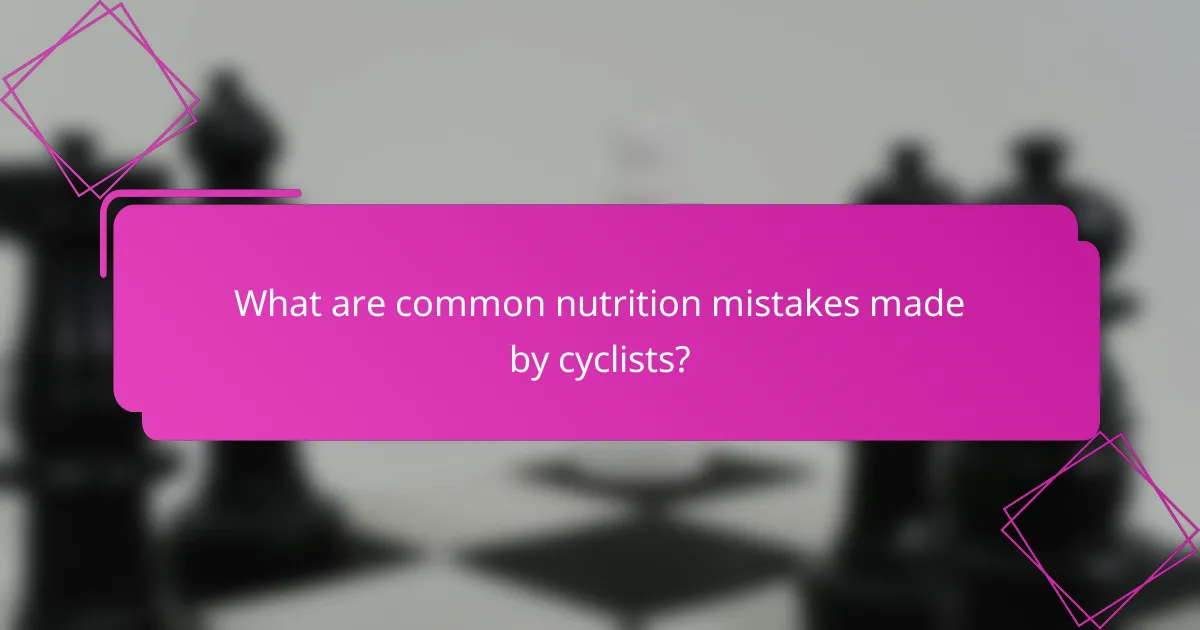
What are common nutrition mistakes made by cyclists?
Common nutrition mistakes made by cyclists include inadequate carbohydrate intake, neglecting hydration, and overlooking recovery nutrition. Many cyclists fail to consume enough carbohydrates, which are crucial for sustained energy during rides. Hydration is often underestimated, leading to decreased performance and increased fatigue. Additionally, not prioritising post-ride nutrition can hinder recovery and overall performance.
How can under-fuelling impact cycling performance?
Under-fuelling significantly reduces cycling performance by causing fatigue, decreased endurance, and impaired recovery. Insufficient energy intake leads to muscle glycogen depletion, affecting stamina during long rides. Cyclists may experience slower speeds and increased perceived exertion when not consuming adequate calories. Proper nutrition, including carbohydrates, proteins, and hydration, is essential for optimal performance and recovery.
What are the risks of over-hydration during rides?
Over-hydration during rides can lead to serious health risks, including hyponatremia, which is a dangerous drop in sodium levels. Symptoms may include nausea, headache, confusion, and in severe cases, seizures or coma. Maintaining a balanced intake of fluids and electrolytes is crucial for optimal performance and safety. Cyclists should monitor hydration levels and adjust fluid intake based on duration and intensity of rides.
How can cyclists avoid gastrointestinal issues from food choices?
Cyclists can avoid gastrointestinal issues by selecting easily digestible foods and timing their intake properly. Focus on low-fibre carbohydrates, such as white rice and bananas, before rides. Consume small amounts of food frequently, rather than large meals. Hydration is crucial; drink water and electrolyte solutions to support digestion. Avoid high-fat and high-fibre foods close to cycling sessions, as they can cause discomfort.
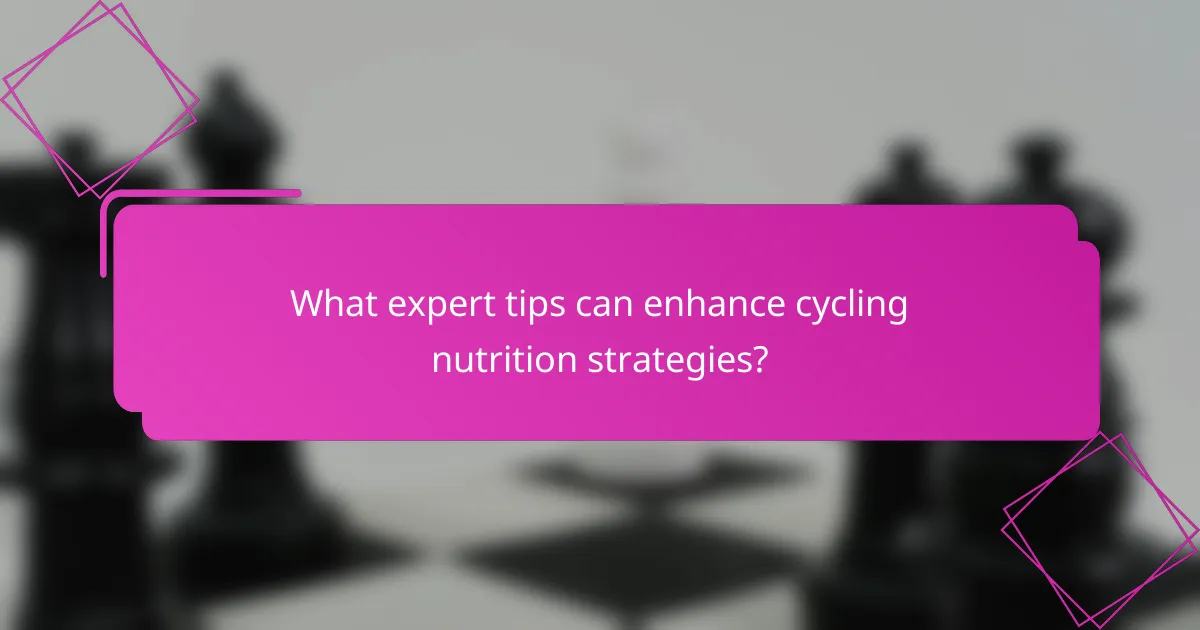
What expert tips can enhance cycling nutrition strategies?
To enhance cycling nutrition strategies, focus on whole foods, proper timing, and hydration. Prioritise carbohydrates for energy, proteins for recovery, and healthy fats for sustained endurance.
1. Choose nutrient-dense foods like fruits, vegetables, whole grains, lean proteins, and healthy fats.
2. Time your meals: consume carbohydrates 30-60 minutes before cycling, and protein within 30 minutes post-ride.
3. Stay hydrated: drink water regularly and consider electrolyte-rich beverages during long rides.
These strategies will optimise performance and recovery.
How can meal prepping support consistent nutrition for cyclists?
Meal prepping supports consistent nutrition for cyclists by ensuring they have balanced meals ready to fuel their rides. This practice allows cyclists to manage macronutrient intake effectively, optimising energy levels and recovery.
Preparing meals in advance helps cyclists maintain a steady supply of carbohydrates, proteins, and healthy fats. For example, including whole grains, lean meats, and vegetables in meal prep can enhance endurance and performance.
Additionally, meal prepping promotes hydration strategies by allowing cyclists to plan and pack electrolyte-rich drinks. This reduces the risk of dehydration during rides, which is crucial for maintaining stamina.
By adhering to a meal prep routine, cyclists can avoid last-minute unhealthy food choices. This discipline reinforces their nutrition goals, leading to improved overall cycling performance and health.
What are the benefits of consulting a sports nutritionist?
Consulting a sports nutritionist offers tailored dietary strategies that enhance performance and recovery for road cyclists. They provide expert guidance on optimal food choices, timing, and hydration techniques essential for endurance. Personalised plans can lead to improved energy levels, better weight management, and enhanced overall health. Nutritionists can also address unique dietary needs, ensuring cyclists meet their specific goals effectively.
Which cycling nutrition apps can help track intake effectively?
Several cycling nutrition apps can effectively track intake, including MyFitnessPal, Cronometer, and Strava. These apps allow cyclists to log food, monitor hydration, and analyse nutrient intake in real-time. MyFitnessPal offers a vast food database, while Cronometer focuses on detailed nutrient tracking. Strava integrates cycling performance with nutrition insights. All three apps support personalised goals and can enhance overall cycling nutrition strategies.
